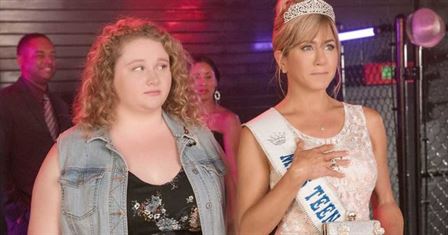While some may think the plot follows a familiar pattern seen in Hollywood coming-of-age stories revolving around self-discovery, Netflix’s “Dumplin’” is a breath of fresh air. On its surface, “Dumplin’” is a soft, delightful comedy about beauty pageants and learning to be yourself in the face of society and its views on beauty.
The film starts off by laying a foundation of self-confidence as the central theme of the plot. Early on, we are introduced to Ellen Dryver, a motivating character that becomes Willowdean’s friend through introductions by her aunt Lucy.
In the first two minutes of the film, we see Willowdean Dickson, dubbed Dumplin’, teased by children in her town over her weight. Will spends a large portion of her youth raised and taught by her aunt Lucy, who encourages a love of Dolly Parton, self-confidence and pushes Will to love herself.
The turning point of the film comes when Will’s aunt Lucy passes away six months before she and her friend Ellen began their last year of high school.
The film takes a rather interesting turn on Will and Ellen’s first day of school, when Will is suspended after protecting another overweight girl, Millie, from a school bully. Following this, Will blames her mother Rosie, played by Jennifer Aniston, for being ashamed of her appearance and is disappointed when her mother implies her aunt would still be alive if she took better care of her health.
Will’s war with her mom moves to new heights when she stumbles upon some of her late aunt’s things, including a half-filled entry form for a beauty pageant back in 1993, when her aunt was a teen.
Understanding that her confident, brave aunt could have possibly never submitted her application due to her own insecurities about her image prompts Will to fill out an application left by her aunt.
This incites a public frenzy among the students and townsfolk in Texas — or more importantly, the tense relationship between Will and her mother. The film is a continuous test for the main character as she struggles with acceptance from her classmates and acceptance from her mother.
At many points, the film can be uncomfortable and even cringe-worthy as we witness many harsh subjects, such as societal beauty standards and the need to be thin. From the hairspray to body-hugging dresses and picture-perfect posture, Will’s mother Rosie constantly pushes to the audience what the standard to be considered “beautiful” is, which is especially cringe-worthy. Audiences witness through the gaze of Aniston a rather complex expectation of what women are taught that beauty is supposed to mean.
Moreover, I love how even though Will is pressured to conform by her mother’s and peers’ beauty standards, she rebels with her best friend Ellen, who unintentionally start a movement of self-confidence for all women of all body types. This film pushes its audience to rethink different standards of beauty.
After some melancholic Dolly Parton songs and an authentic understanding of the hardships of female teen friendships and images of beauty, “Dumplin’” is an everlasting story that moves from conventional teen-film cliche genre to a new place that not only produces laughs but encourages all women to love themselves no matter what size they are.



